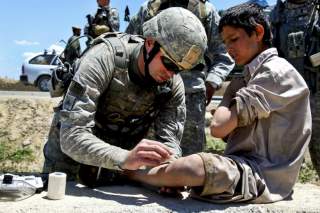Why the World Is Giving Afghanistan Over $15 Billion
The Afghan government won donor support with commitments to reform, better governance, and improved performance.
At the heart of the Brussels Conference was an agreement providing more discretionary donor assistance to finance Afghan-owned development in return for more accountability to deliver on promises for more efficient assistance delivery and better governance. This deal needs to be made effective in the months ahead.
Peace and Security
The prospect for peace was on the minds of those in Brussels, with the recognition that near term progress with the Taliban seems unlikely. But, the announcement of a peace agreement with former warlord Gulbuddin Hekmatyar signaled that progress is possible. Secretary of State Kerry highlighted the agreement in Brussels, adding that the “conflict cannot end and will not be won on the battlefield” but via a political settlement negotiated with the Afghan government.
Whatever the near term prospect for peace, the operational goal shared by its partners is an Afghanistan increasingly capable of handling its security challenges and governance duties with increasingly modest foreign help. In the longer term, Afghanistan’s partners seek a peaceful, prosperous and better-governed country that contributes to regional security.
The agreement to emerge from Brussels is an essential element in moving toward these overarching goals. Assuring sustainable development aid flows needed to make economic and social progress possible is vital as is the effectiveness of Afghanistan’s security forces. International support is essential here too. Afghan forces have demonstrated courage and suffered many casualties. Yet, their performance, and their leadership, must continue to improve if they are to contain and weaken the Taliban and other violent and extremist actors, and increase the prospects for a path to peace. Advances require progress against ethnic divisiveness and corruption in the security forces.
Equally important is that Afghanistan's government and its political elites find ways to avoid the paralysis and delay that characterized too much of the last two years and that they agree on a way forward on the internal political agenda, including parliamentary elections.
A New U.S. President
In the United States, the new president will review the situation and work through key decisions about U.S. engagement, for example, on the U.S. troop presence, strategy and force mix, on the size and focus of development assistance, on coordination with the Afghan government and other partners, and importantly, on policy toward Pakistan.
Those former U.S. officials and experts with Afghan experience who issued the report cited above in September argue that a mutual commitment for a long-term partnership with the Afghan people and government is in the interests of the United States and others now supporting Afghanistan. The outcomes of the Brussels Conference are a key part of making that long-term partnership a reality.
Earl Anthony Wayne is a former U.S. Ambassador and Assistant Secretary of State for Economic and Business Affairs. He served in Kabul from 2009-2011. He is currently a Senior Non-Resident Advisor at CSIS and a Public Policy Fellow at the Woodrow Wilson Center.
Image: U.S. Army Sgt. John Russell gives a small child medical care in Logar Province, Afghanistan.

